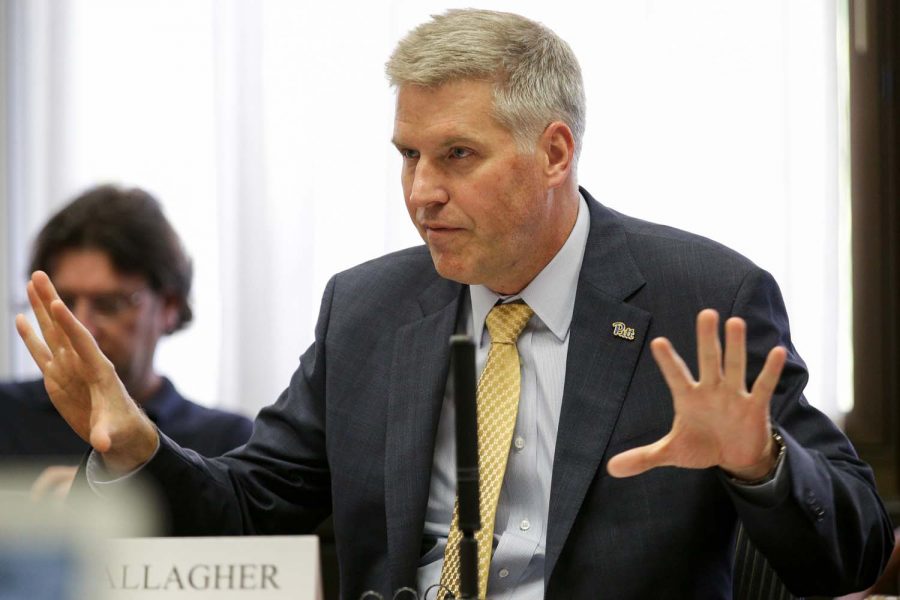Pitt to require COVID-19 containment measures for the unvaccinated
Chancellor Patrick Gallagher, one of the top administrators at Pitt.
July 23, 2021
Pitt will require unvaccinated students and employees to take part in a series of strict COVID-19 containment measures this fall, Chancellor Patrick Gallagher said in a Friday afternoon email.
These measures include mandatory virus testing at a frequency to be established by the COVID-19 Medical Response Office, but could be as often as weekly; contact tracing to identify potential exposure; quarantine and/or isolation if exposed or infected; and negative COVID-19 test results before students living in on-campus housing arrive.
Gallagher added that virus measures this fall will likely depend on an individual’s vaccination status. For example, Pitt may relax certain “global mitigation” strategies — actions taken by everyone on campus, such as using face coverings or social distancing — or containment strategies, such as contact tracing, for individuals who are fully vaccinated. Failure to comply with any required virus control measure may result in disciplinary action, Gallagher said, including the loss of access to University buildings and activities.
Gallagher said Pitt plans to release details by early August on how students and employees can disclose their vaccination status. He added that the University will assume that every student and employee is unvaccinated unless they disclose otherwise and provide evidence of being fully vaccinated. The University has encouraged students, faculty and staff to get vaccinated in preparation for the fall semester by offering prizes, including several thousand dollars in cash.
“We are incentivizing, offering and promoting vaccination with the goal of having everyone on our campuses fully vaccinated — barring medical or religious exemptions — when classes begin,” Gallagher said.
Kenyon Bonner, the vice provost and dean of students, said in early July that students living in University housing must either submit proof of vaccination or request an exemption through the Student Health Center to not have to comply with the extra precautions for unvaccinated individuals.
Gallagher had previously mentioned at June’s Board of Trustees meeting the possibility of last year’s COVID-19 regulations — such as testing, quarantining and PPE — sticking around, assuming not all students on campus will be vaccinated.
“The plans for the fall at Pitt are based on a simple fact,” Gallagher said in June. “We believe that the vaccines are safe, available and highly effective. We strongly recommend and expect all of our community — students, faculty and staff — to be fully vaccinated before they come back on campus for the fall term.”
While Pitt has no plans to require vaccinations, Pitt’s Senate Council at its May 26 meeting voted 79% in favor of a resolution mandating a COVID-19 vaccine for students and employees to be on campus. The resolution included exceptions for “medical conditions, religious beliefs and access to vaccines.” Pitt’s Student Government Board said in June that it stands in “solidarity” with the Senate Council vote.
Gallagher said in the Friday email that while Pitt’s goal is to have everyone fully vaccinated, enforcing a vaccination mandate is “not realistic for many reasons.” He added that most universities that have announced vaccination mandates are, like Pitt, preparing to accommodate unvaccinated individuals on campus and in university activities.
“The University of Pittsburgh is not neutral on vaccination,” Gallagher said. “Everyone who can get vaccinated should be vaccinated — and our objective is to achieve very high immunization rates on our campuses.”



